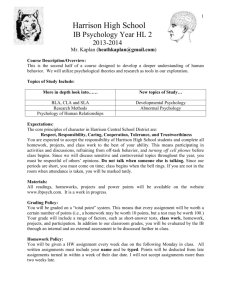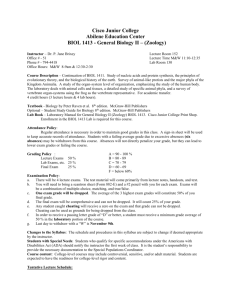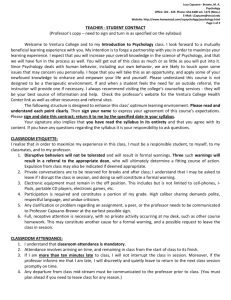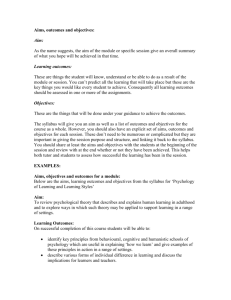PSYC_2301-BarteeT
advertisement
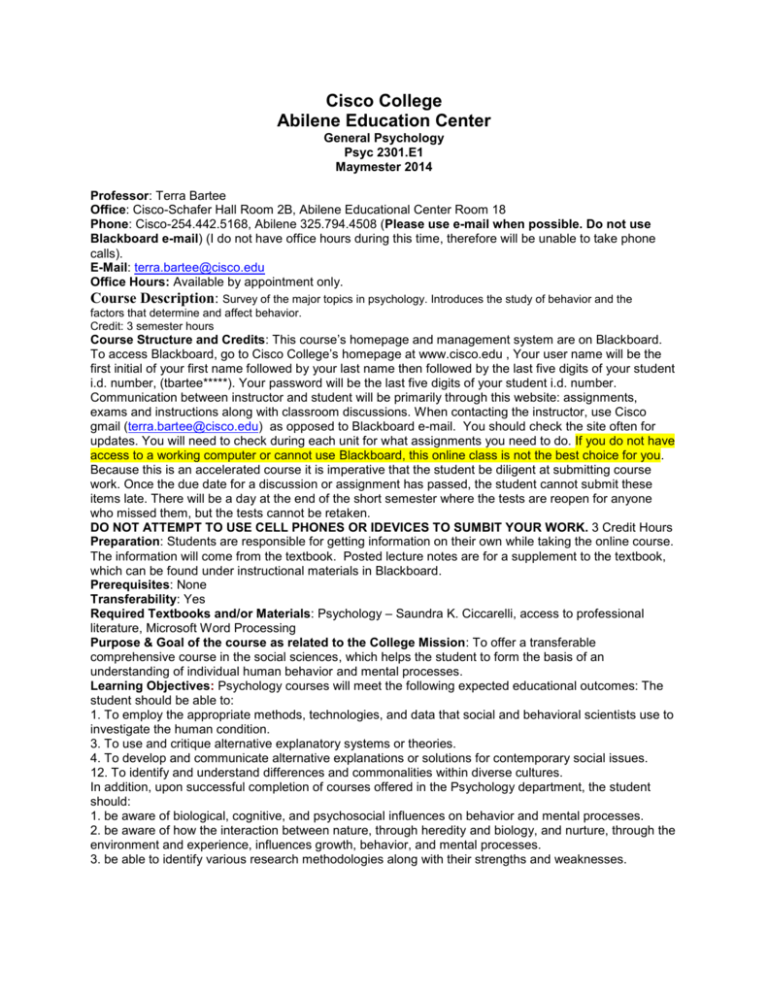
Cisco College Abilene Education Center General Psychology Psyc 2301.E1 Maymester 2014 Professor: Terra Bartee Office: Cisco-Schafer Hall Room 2B, Abilene Educational Center Room 18 Phone: Cisco-254.442.5168, Abilene 325.794.4508 (Please use e-mail when possible. Do not use Blackboard e-mail) (I do not have office hours during this time, therefore will be unable to take phone calls). E-Mail: terra.bartee@cisco.edu Office Hours: Available by appointment only. Course Description: Survey of the major topics in psychology. Introduces the study of behavior and the factors that determine and affect behavior. Credit: 3 semester hours Course Structure and Credits: This course’s homepage and management system are on Blackboard. To access Blackboard, go to Cisco College’s homepage at www.cisco.edu , Your user name will be the first initial of your first name followed by your last name then followed by the last five digits of your student i.d. number, (tbartee*****). Your password will be the last five digits of your student i.d. number. Communication between instructor and student will be primarily through this website: assignments, exams and instructions along with classroom discussions. When contacting the instructor, use Cisco gmail (terra.bartee@cisco.edu) as opposed to Blackboard e-mail. You should check the site often for updates. You will need to check during each unit for what assignments you need to do. If you do not have access to a working computer or cannot use Blackboard, this online class is not the best choice for you. Because this is an accelerated course it is imperative that the student be diligent at submitting course work. Once the due date for a discussion or assignment has passed, the student cannot submit these items late. There will be a day at the end of the short semester where the tests are reopen for anyone who missed them, but the tests cannot be retaken. DO NOT ATTEMPT TO USE CELL PHONES OR IDEVICES TO SUMBIT YOUR WORK. 3 Credit Hours Preparation: Students are responsible for getting information on their own while taking the online course. The information will come from the textbook. Posted lecture notes are for a supplement to the textbook, which can be found under instructional materials in Blackboard. Prerequisites: None Transferability: Yes Required Textbooks and/or Materials: Psychology – Saundra K. Ciccarelli, access to professional literature, Microsoft Word Processing Purpose & Goal of the course as related to the College Mission: To offer a transferable comprehensive course in the social sciences, which helps the student to form the basis of an understanding of individual human behavior and mental processes. Learning Objectives: Psychology courses will meet the following expected educational outcomes: The student should be able to: 1. To employ the appropriate methods, technologies, and data that social and behavioral scientists use to investigate the human condition. 3. To use and critique alternative explanatory systems or theories. 4. To develop and communicate alternative explanations or solutions for contemporary social issues. 12. To identify and understand differences and commonalities within diverse cultures. In addition, upon successful completion of courses offered in the Psychology department, the student should: 1. be aware of biological, cognitive, and psychosocial influences on behavior and mental processes. 2. be aware of how the interaction between nature, through heredity and biology, and nurture, through the environment and experience, influences growth, behavior, and mental processes. 3. be able to identify various research methodologies along with their strengths and weaknesses. 4. be able to recognize major psychological theories, such as psychoanalytic, behavioral, social-cognitive, biological, and humanistic, and how these approaches differ, but each have worth and merit in the successful explanation of behavior and mental processes. 5. be able to separate facts from myths regarding psychological disorders. 6. be able to recognize the social influence on an individual’s behavior and mental processes. According to the ACGM Learning Outcomes, upon the successful completion of this course, students will: 1. Research methods: Identify research findings through the application of the scientific method. OR Exhibit an understanding and ability to apply basic research methods in psychology including research design, data analysis, and interpretation. 2. Identify factors in the historical development of the study of human behavior including current theoretical perspectives prominent in the field of psychology. 3. Identify terminology unique to the study of psychology. 4. Identify accepted approaches and standards in psychological assessment and evaluation. 5. Identify factors in physiological and psychological processes involved in human behavior. Methods of Assessment and Grading Policy: 4 Chapter Exams, 100 points each 1 Syllabus Test, 20 points 2 Reaction Assignments, 50 points each 10 Discussion Essays, 10 points each 1 Final Exam, 100 points A total of 720 points are available. >648 = A 576-647 = B 504-575 = C 432-503 = D <432= F Chapter Exam format: Multiple Choice Exams There are four chapter exams consisting of 50 multiple choice questions. Students will have one hour to complete each exam. Once the student begins the exam it must be completed. The student must be sure to save all answers before submitting the test, and it is imperative that the student completes the test once he or she begins the test. Students are not allowed to retake an exam (exams will not be reset under any circumstances), therefore it is imperative that the student completes the test on the first try, and that the test is taken on a reliable computer in a reliable building (one in which the electricity will not randomly go off). If a student misses an exam due to an excused absence (see student handbook for a definition of excused absences), he or she will have an opportunity to take the exam on make up day. It is wise to take the exam prior to the due date in case any problems arise. Syllabus Quiz format: 10 multiple choice items covering the material in the syllabus Final Exam format: 50 short answer items and 25 multiple choice items. Reaction Assignments: Students are asked to retrieve a professional peer-reviewed journal article from the Cisco College library database system. The student will read the article then type a one page (double spaced) summary of and reaction to the article. The student will also create an APA reference for the article. To submit the Reaction Assignment first create the assignment in Microsoft Word (it must be created in Microsoft Word or I cannot open it, therefore I cannot grade it) and save the assignment, click on the Assignments tab, click on either Reaction Assignment 1 or Reaction Assignment 2 (whichever one you are turning in), click on Browse for Local File, choose the file, click on Attach File, click Submit. The assignment must be turned in on or before its due date. Late submissions are accepted with penalty only and must be e-mailed to the professor. Discussions: The student is asked to respond to 10 discussion postings by the professor. To submit a Discussion posting click on the Discussions tab. Choose the available discussion. Click on the thread posted by the professor. Read the posting. Click Reply. Type your posting in the Message area and click Submit. Unless otherwise directed, the student should respond to the professors discussion posting with at least 5 well thought out and organized (as deemed by the professor) sentences. The due dates in this course are non-negotiable. Preparation: Students are responsible for getting information on their own while taking the online course. The information will come primarily from the textbook. The instructor will post outline notes for each chapter that might be useful for the student, and the student might choose to do additional research through professional online sources, library material, etc. Attendance Policy: It is required that all assignments be completed on time. NO EXCEPTIONS! If the professor sees that there is no activity from the student for two weeks, the student may be dropped from the course with no further notification. The student must participate frequently with an online course to be successful. For online or hybrid courses, a student may be dropped after he/she fails to access the course web site and/or participate in the class for a two-week period, and the professor deems the student to be failing. During a Summer I or II regular face-to-face class, a student is allowed two absences. Upon the third absence, he/she may be dropped from the class if the professor deems the student to be failing due to excessive absences and/or failure to make up work due to absences. For any Minimester or Summer night class, a student is allowed one absence. Upon the second absence, he/she may be dropped from the class if the professor deems the student to be failing due to excessive absences and/or failure to make up work due to absences. Any student who ceases to attend class without officially withdrawing through the Admissions Office is subject to a grade of F. The student will receive a grade of W for the course if withdrawn before the last day to drop with a W, and an F if withdrawn after the last day to drop with a W. Three tardies may constitute an absence. Absences immediately before or after a holiday may be counted as double absences. (exerted from the student handbook) Major Units of Study: The Science of Psychology, The Biological Perspective, Sensation and Perception, Consciousness: Sleep, Dreams, Hypnosis, Drugs, Learning, Memory, Development Across the Lifespan, Cognition: Thinking, Intelligence, and Language, Motivation and Emotion, Sexuality and Gender, Stress and Health, Theories of Personality, Social Psychology, Psychological Disorders, and Psychological Therapies Notices: Course Content: College-level courses may include controversial, sensitive, and/or adult material. Students are expected to have the readiness for college-level rigor and content. Academic Integrity: It is the intent of Cisco College to foster a spirit of complete honesty and a high standard of integrity. The attempt of students to present as their own any work they have not honestly performed is regarded by the faculty and administration as a serious offense and renders the offender liable to serious consequences, possibly suspension. If the student is found to have participated in academic integrity he or she will immediately be removed from the course. Please refer to the student handbook for additional information on Academic Integrity. Student Conduct: Students are expected to take responsibility in helping to maintain a classroom environment that is conducive to learning. In order to assure that all students have the opportunity to gain from the time spent I class, students are prohibited from using cell phones or beepers, making offensive remarks, reading material not related to class, sleeping, or engaging in any other form of distraction. Inappropriate behavior in the classroom shall result, at a minimum, in a request to leave class. A more detailed list of inappropriate behaviors is found in the current student handbook. Changes to the Syllabus: The schedule and procedures in this syllabus are subject to change if deemed appropriate by the instructor. Students with Special Needs: Students who qualify for specific accommodations under the Americans with Disabilaties Act (ADA) should notify the instructor the first week of class. It is the student’s responsibility to provide the necessary documentation to the Special Populations Coordinator.
